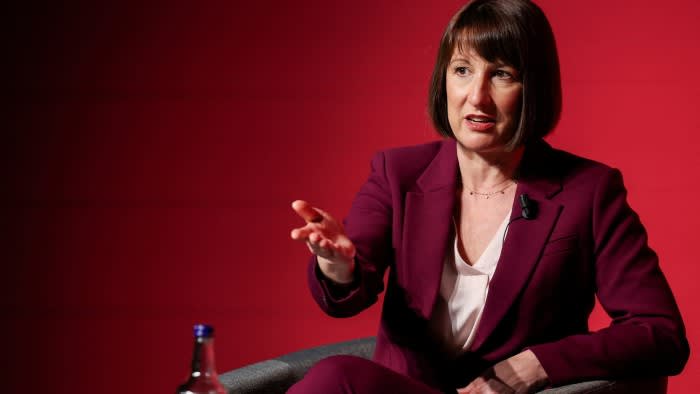Unlock the Editor’s Digest for free
Roula Khalaf, Editor of the FT, selects her favourite stories in this weekly newsletter.
Rachel Reeves has attacked her predecessor for cutting back on planned investment as she cleared the way for billions of pounds of extra capital spending in this month’s Budget.
Forecasts produced under the Conservative government in March pointed to a succession of cuts in public sector net investment as a share of the GDP, Reeves told reporters on Thursday.
“Investment was not prioritised by the last government. I am not going to make those mistakes,” said the UK chancellor.
Reeves declined to set out details of her ambitions on public investment.
Keeping it at this year’s level as a share of GDP would imply £24bn of extra annual spending by 2028-29, according to the Institute for Fiscal Studies. Avoiding real-terms investment cuts over the same period would imply an £18bn top-up to spending by that year.
Those figures would go beyond plans laid out in Labour’s manifesto, which implied annual increases in investment of just under £5bn.
Reeves’s words came as the government pledged to support two carbon capture and storage projects as part of a drive to invest £22bn in the sector over 25 years.
She said the projects would be “at the heart of our plan to deliver strong growth and investment, so we can rebuild Britain and make everyone better off”.
The Treasury declined to lay out the details of how the project would have an impact on the public finances.
But Reeves reiterated pledges made at the Labour conference last month to find better ways of counting the benefits as well as the liabilities from borrowing to invest.
“I will set out the details of the fiscal rules in the Budget, but we have to make sure we unlock that space for capital investment,” Reeves told reporters.
Forecasts in the Conservatives’ March 2024 budget showed declines every year in public sector net investment as a share of GDP, going from 2.4 per cent to 1.7 per cent by 2028-29.
“They were cutting back on investment at exactly the time when we need to be increasing investment in our economy,” said Reeves.
Jeremy Hunt, then Conservative chancellor, said in March that the budget would guarantee “more investment and better jobs in every corner of the country”, describing the package as a long-term budget for growth.
A Tory spokesperson said: “The Labour party should spend more time on actually developing a growth plan for the Budget instead of scaring off business investment.”
Labour is contemplating reforms to its fiscal framework to create extra borrowing capacity for public investment as it grapples with tight constraints given its decision to embrace a rule requiring public debt to fall as a share of GDP between the fourth and fifth years of the forecast.
A shift in the debt target to alternative metrics such as public sector net worth or public sector net financial liabilities would create extra budget wriggle room exceeding £50bn, based on the March forecast, analysts estimate.
However, economists warn that it would be risky for the Treasury to contemplate extra borrowing for investment of that kind of magnitude, given the need to maintain market confidence.
Ben Nabarro, UK economist at Citigroup, has argued a “cautious” initial plan would see investment spending dialled up gradually, for example by about £5bn-£10bn per year over the course of the parliament.
Reeves was speaking on an afternoon when oil prices jumped amid continued concern about escalating hostilities in the Middle East.
Asked about the impact of higher energy prices, Reeves said that while oil prices remained off their recent highs, there were big risks to the economy if there was a full-blown regional conflict.
